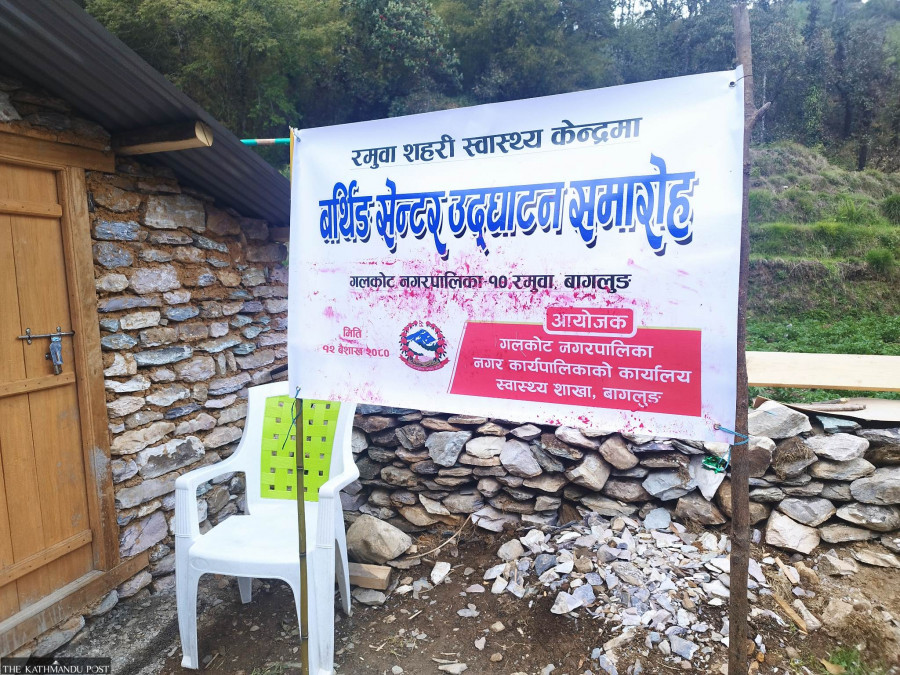All 11 wards of Galkot Municipality now have health centres qualifying the local unit to declare itself child-friendly.

As an urban health centre with birthing services has come into operation in Ramuwa village, Galkot Municipality has achieved the final milestone in achieving a child-friendly status.
Local units have to abide by the 51-point guidelines set by the federal government so as to qualify to become a child-friendly local unit.
In a bid to improve the lives of children by realising their rights as articulated in the constitution, the municipality aims to meet all the standards set by the government.
Bharat Sharma Gaire, the mayor of Galkot Municipality, says the municipality is committed to providing safe delivery options to pregnant women, protecting the rights of children, improving their lives, and securing their future.
“Work was already underway towards building a child-friendly environment in the municipality, but we still had some work to complete in the health sector,” Gaire said. “Our work is now complete with the establishment of an urban health centre with birthing services in Ramuwa.”
The health centre in Ramuwa, an outlying village in ward 10 of the municipality, came into operation on Wednesday.
Pregnant women and postpartum mothers from Ramuwa have to travel to Pandavkhani to avail of general medical services and to Hatia Bazar, the administrative centre of the municipality which has health centres with birthing services to seek maternity services and safe institutional delivery options.
Ramuwa villagers have to travel for almost five hours on a dirt road to reach Hatiya Bazaar. Radhika Pun, a local woman from Ramuwa, said pregnant women and their families would rent a room in Hatiya Bazaar weeks before the delivery date to avoid the risky road travel. “Pregnant women from Ramuwa face a lot of difficulties to reach the bazaar. To prevent any mishaps, families rent rooms in the bazaar area and in doing so, spend more money than they have,” said Pun. “The operation of the birthing centre here in the village itself has made maternity services accessible to rural women like us. This will also mitigate the risk of maternal and infant deaths.”
Pun went on, “We are also very happy that having a birthing facility in our village will allow the municipality to work towards creating a child-friendly environment wherein children will get special care and protection; good education and health services.”
According to Gaire, the facility was set up with financial support from donors and labour contribution by locals. “The centre spent Rs1 million and the municipality spent an additional Rs100,000 on beautification,” said Gaire. The Rural Health Improvement Project, a social organisation, also supported the efforts of the municipality and provided beds and medical equipment required in the birthing room, according to Gaire.
There are 11 wards in Galkot Municipality and now all the wards have health centres with maternal services.
“The operation of the birthing centre has ensured women safe delivery options. They will no longer have to give birth at home which is risky for both the mother and child,” said Kriti Shreesh, head of the centre. “Avoiding home births is one of the first steps in creating a child-friendly environment. The establishment of this centre ensures that.”
A child-friendly municipality can be defined as a place where the voices, needs, priorities, and rights of children are understood as integral parts of public policies, programmes, and decisions in the municipality. Among the 51 points, there are 13 that highlight the rights of children in the education sector and 12 in the health sector.
According to Sushil Poudel, head of the health unit of the municipality, the local unit’s aim to provide safe delivery services to pregnant women is in line with its work towards creating a child-friendly space.
“The municipality plans to declare itself child-friendly by the end of May,” said Poudel. “After the announcement, a new set of guidelines will be issued for the protection of child rights. The municipality has successfully established a health and birthing centre in all 11 wards. The Ramuwa centre will be staffed by two obstetricians.”
The government gives Rs1,800 to women opting for institutional births and the Galkot Municipality provides them additional allowance from its own sources. If a pregnant woman gives birth at a health institution and makes four post-natal visits, the municipality gives them an additional Rs4,600.
The birthing centre in Ramuwa is expected to provide maternity services to at least 20 women every year and also serve women from the neighbouring Badigad Rural Municipality.











